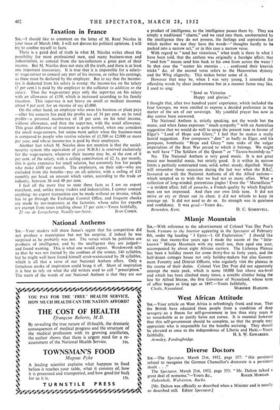Taxation in France
SIR,—I should like to comment on the letter of M. Rent Nicolas in your issue of March 14th. I will not discuss his political opinions. I will try to confine myself to facts.
There is a good deal of truth in what M. Nicolas writes about the possibility for most professional men, and many business-men and industrialists, to conceal from the tax-collectors a great part of their income. But M. Nicolas does not state all the truth, and there is at least one important inaccuracy. It is true that it is impossible for a salary- or wage-earner to conceal any part of his income, or rather his earnings, as these must be declared by the employer. But to say that the income- tax is deducted from his salary is wrong: the income-tax on the salary (5 per cent.) is paid by the employer to the collector in addition to the salary. Thus the wage-earner pays only the super-tax on his salary with an allowance of £150, which is increased according to his family situation. This super-tax is not heavy on small or medium incomes: about 9 per cent, for an income of say .£1,000.
On the other hand, an employer who owns his business or plant pays —after his concern has paid the profits tax of 34 per cent, on its total profits—a personal income-tax of 18 per cent. on his total income, without allowance, and then the super-tax, with the usual allowance. This great difference of treatment is quite normal, when one considers the small wage-earners, but seems most unfair when the business-man is compared to people who receive salaries of £1,500 or £2,000 or more per year, and whcse income-tax is paid by their employers.
Another fact which M. Nicolas does not mention is that the social- security system (the equivalent of your N.H.S.) is reserved exclusively for the wage-earners, whatever their income may be, at the cost of 6 per cent. of the salary, with a ceiling contribution of £2 Is. per month; this is quite expensive for small salaries, but extremely low for people who make £100 per month. The employers, on their side—who are excluded from the benefits—pay on all salaries, with a ceiling of £.35 monthly per head, an amount which varies, according to the trade or industry, between 30 and 40 per cent.
I feel all the more free to state these facts as I am an export merchant, and, unlike many traders and industrialists, I cannot conceal anything: no export transaction can be made without an invoice, which has to go through the Exchange Control Office, and frequent checks are made by tax-inspectors at the factories, whose sales for exportt are exempt from taxes totalling about 17 per cent.—Yours faithfully, 21 rue de Longchamp. Neuilly-sur-Seine. JEAN COHEN.


































 Previous page
Previous page